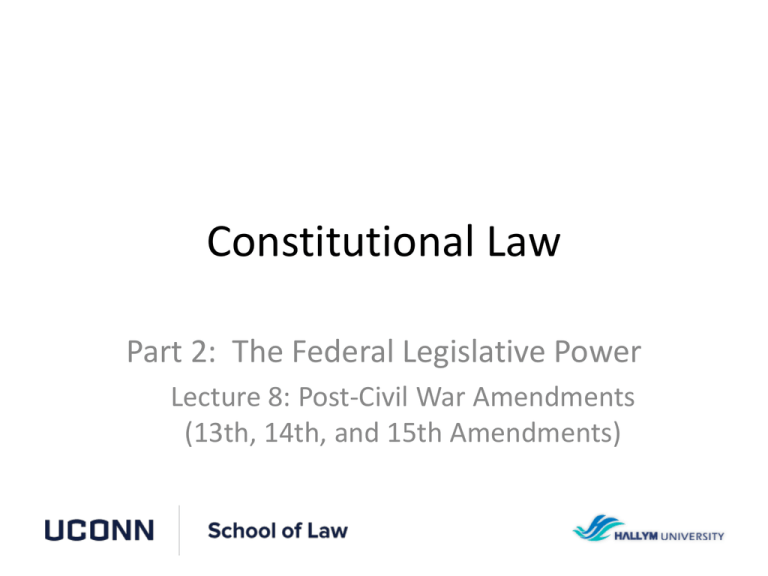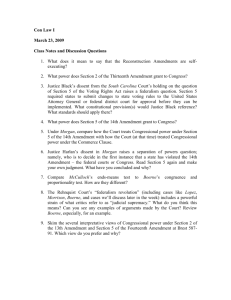Part 2, Lecture 8
advertisement

Constitutional Law Part 2: The Federal Legislative Power Lecture 8: Post-Civil War Amendments (13th, 14th, and 15th Amendments) Post-Civil War Reconstruction Amendments • After the Civil War, three vitally important amendments were added to the Constitution: 1. 2. 3. • The Thirteenth Amendment prohibits slavery and involuntary servitude, except as a punishment for a crime. The Fourteenth Amendment provides that all persons born or naturalized in the United States are citizens and that no state can abridge the privileges or immunities of such citizens; nor may states deprive any person of life, liberty, or property without due process of law or deny any person of equal protection of the laws. The Fifteenth Amendment declares that “[t]he right of citizens of the United States to vote shall not be denied or abridged by the United States or by any State on account of race, color, or previous condition of servitude.” Each amendment also provides that “Congress shall have power to enforce this article by appropriate legislation.” Constitutional Law – Professor David Thaw Part 2 Lecture 7 Slide 2 Congress’ Power Under the Amendments • Two questions to consider regarding Congress’ power: 1. What is the scope of Congress’ power under these amendments? 2. May Congress regulate private conduct under this authority, or is Congress limited to regulating only government activities? ⁻ In the Civil Rights Cases, the Court held that pursuant to section 2 of the Thirteenth Amendment and section 5 of the Fourteenth Amendment, Congress may regulate only state and local government actions, not private conduct. Constitutional Law – Professor David Thaw Part 2 Lecture 7 Slide 3 Civil Rights Cases • The Civil Rights Act provided that all persons were “entitled to the full and equal enjoyment of the accommodations, advantages, facilities and privileges of inns, public conveyances, on land or water, theatres, and other places of public amusement; subject only to the conditions and limitations established by law, and applicable to citizens of every race and color, regardless of any previous condition of servitude.” • The Court held that the Act was unconstitutional and adopted a restrictive view as to the power of Congress to use these provisions to regulate private behavior. – The Court stated that Congress could abolish “all badges and incidents of slavery,” but it could not use its power under the Thirteenth Amendment to “adjust what may be called the social rights of men and races in the community.” – The Court also held that Congress lacked authority to enact the law under the Fourteenth Amendment because the Fourteenth Amendment only applies to government action and therefore cannot be used by Congress to regulate private behavior. Constitutional Law – Professor David Thaw Part 2 Lecture 7 Slide 4 Congress’ Power under Section 5 of the 14th Amendment • Two different views regarding the scope of Congress’ Power under Section 5 of the 14th Amendment: 1. Broad – accords Congress authority to interpret the 14th Amendment to expand the scope of rights or even to create new rights • Congress may create rights by statue where the Court has not found them in the Constitution, but Congress cannot dilute or diminish constitutional rights (Katzenbach) 2. Narrow – accords Congress only authority to prevent or provide remedies for violations of rights recognized by the Supreme Court. • Congress cannot expand the scope of rights or provide additional rights (City of Boerne) Constitutional Law – Professor David Thaw Part 2 Lecture 7 Slide 5 Katzenbach v. Morgan & Morgan Background • The Voting Rights Act provides that no person who has successfully completed the sixth grade in a Puerto Rican school shall be denied the right to vote because of the inability to read or write English. • Registered voters in New York City brought suit to challenge the constitutionality of the Act and alleged that it prohibited the enforcement of election laws in New York that required English literacy. Constitutional Law – Professor David Thaw Part 2 Lecture 7 Slide 6 Katzenbach v. Morgan & Morgan Issue 1: Under constitutional law, may the Court use the Equal Protection Clause of the 15th Amendment to nullify New York’s English literacy requirement by legislating under section 5 of the Fourteenth Amendment? Holding 1: The Act is a proper exercise of the powers granted to Congress by Section 5 of the Fourteenth Amendment. • Congress could have concluded that granting Puerto Ricans the right to vote would empower them and help them to eliminate discrimination against them. – This is an argument that the law was constitutional because it was a remedy for discrimination. • The Court also said that Congress could find that the literacy test denied equal protection. – This ruling accords Congress the authority to define the meaning of the Fourteenth Amendment. Constitutional Law – Professor David Thaw Part 2 Lecture 7 Slide 7 Katzenbach v. Morgan & Morgan Issue 2: Is Congress was limited to remedying what the Court had found to violate the Constitution or can Congress independently interpret the Constitution? Holding 2: Congress has broad power under Section 5 and is not confined to the insignificant role of abrogating only those state laws that the judicial branch was prepared to adjudge unconstitutional. • The Court explained that “[b]y including Section 5 the draftsmen sought to grant to Congress, by a specific provision applicable to the Fourteenth Amendment, the same broad powers expressed in the Necessary and Proper Clause.” (CB 257) Constitutional Law – Professor David Thaw Part 2 Lecture 7 Slide 8 City of Boerne v. Flores Background • The City of Boerne had a law that requiring the city's Historic Landmark Commission to preapprove construction affecting landmarks or buildings in a historic district. A church wanted to expand so it applied for a permit, but the commission denied the application. • The church filed suit under the Religious Freedom Restoration Act, which prohibits the government from substantially burdening a person's exercise of religion even if the burden results from a rule of general applicability. Constitutional Law – Professor David Thaw Part 2 Lecture 7 Slide 9 City of Boerne v. Flores Issue: Is the Act a proper exercise of Congress’ Section 5 power to enforce by appropriate legislation the constitutional guarantee that no state shall deprive any person of life, liberty, or property without the due process of law nor deny any person equal protection of the laws? Constitutional Law – Professor David Thaw Part 2 Lecture 7 Slide 10 City of Boerne v. Flores Holding: The Act is unconstitutional because Congress may not create new rights or expand the scope of rights under section 5 of the 14th Amendment, and that it is not proportionate or congruent as a preventive or remedial measure. • Congress is limited to laws that prevent or remedy violations of rights recognized by the Supreme Court and these must be narrowly tailored to the constitutional violation. – Section 5 gives Congress the power to enact laws “to enforce” the provisions of the Fourteenth Amendment. He stated: “Legislation which alters the meaning of the Free Exercise Clause cannot be said to be enforcing the Clause. Congress does not enforce a constitutional right by changing what the right is. It has been given the power ‘to enforce,’ not the power to determine what constitutes a constitutional violation. Were it not so, what Congress would be enforcing would no longer be, in any meaningful sense, the ‘provisions of [the Fourteenth Amendment].’’ (CB 262). – Narrowly tailored means that “[t]here must be a congruence and proportionality between the injury to be prevented or remedied and the means adopted to that end.” (CB 264). Constitutional Law – Professor David Thaw Part 2 Lecture 7 Slide 11 After Katzenbach & City of Boerne • Although Katzenbach broadly interpreted the scope of Congress’ power under the 14th Amendment, City of Boerne narrowed that power. • The Boerne test has been applied consistently in most cases - Congress under §5 cannot expand the scope of rights and any federal law must be a “proportionate” and “congruent” measure to prevent and remedy constitutional violations. • However, Congress has much broader authority to legislate in areas where there is a type of discrimination or a right that receives heightened scrutiny. Constitutional Law – Professor David Thaw Part 2 Lecture 7 Slide 12





